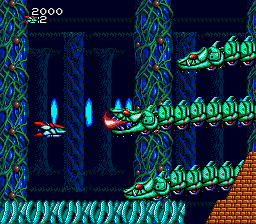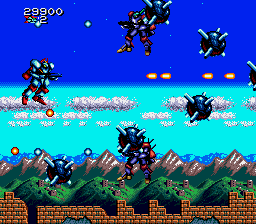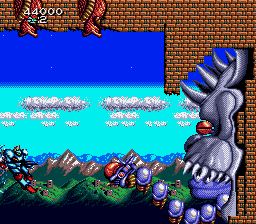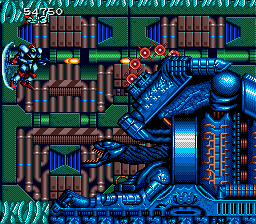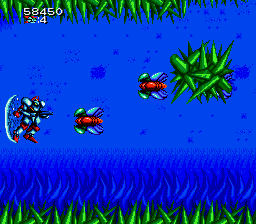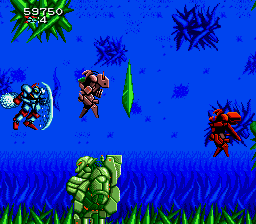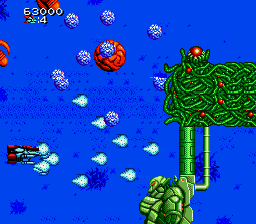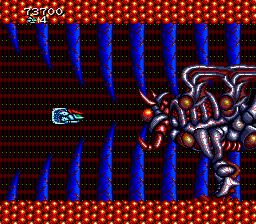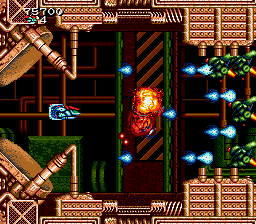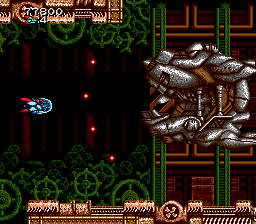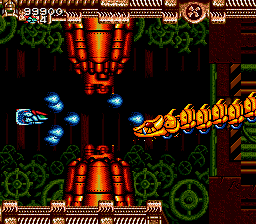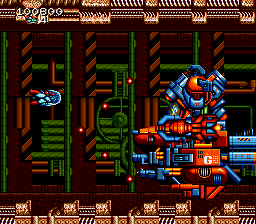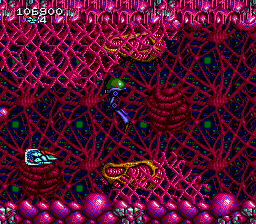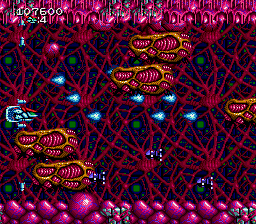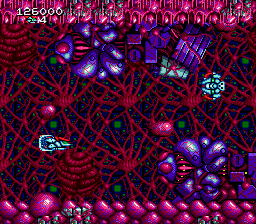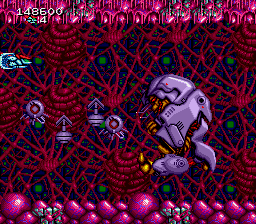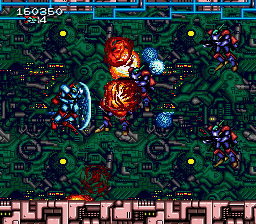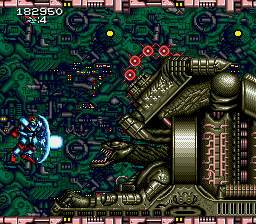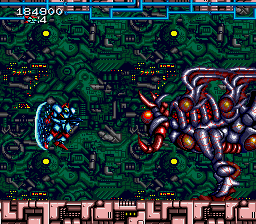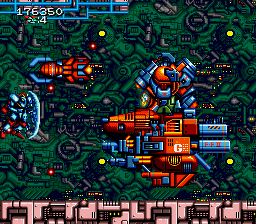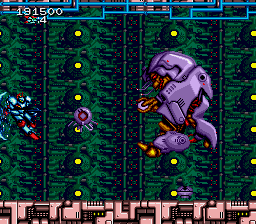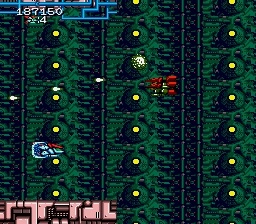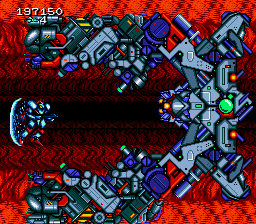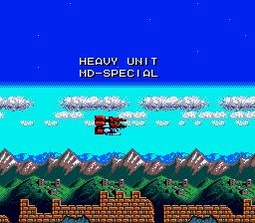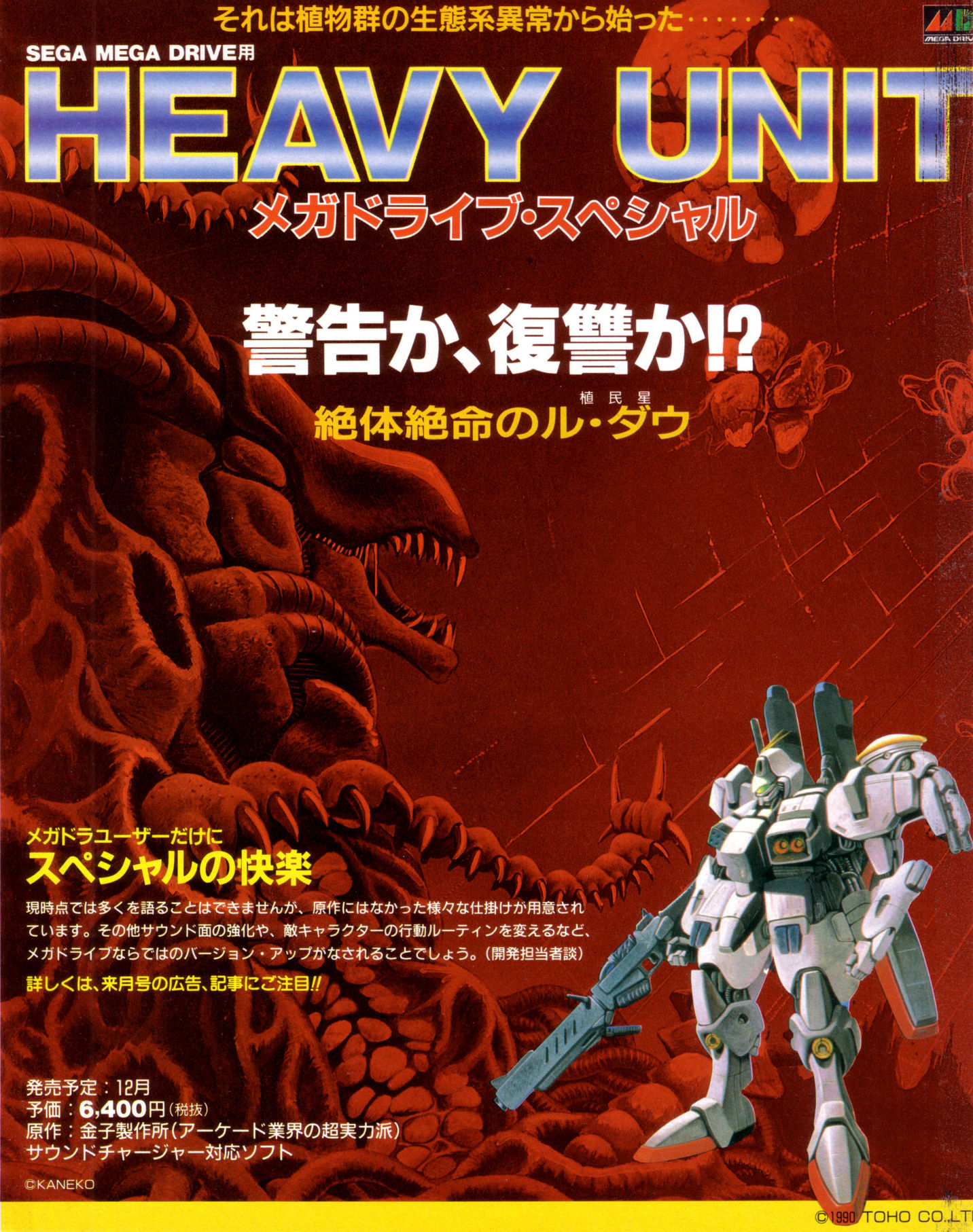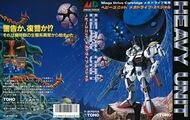Heavy Unit: Mega Drive Special
From Sega Retro
| Heavy Unit: Mega Drive Special | ||||||||||
|---|---|---|---|---|---|---|---|---|---|---|
| System(s): Sega Mega Drive | ||||||||||
| Publisher: Toho[1] | ||||||||||
| Developer: Funari[1] | ||||||||||
| Original system(s): Arcade boards | ||||||||||
| Developer(s) of original games: Kaneko | ||||||||||
| Genre: Shooting[2] | ||||||||||
| Number of players: 1 | ||||||||||
|
Heavy Unit: Mega Drive Special (ヘビーユニット メガドライブスペシャル) is a Sega Mega Drive horizontal shoot-'em-up developed by Funari[1] and published by Toho.[1] An enhanced port of the titular 1988 Kaneko arcade game Heavy Unit, it was released exclusively in Japan in December 1990.[2]
Contents
Story
Humans have developed an artificial planet, "Le Tau," which under attack by genetically modified alien monsters. Only the Heavy Unit, a heavily armed, transforming mecha, can defeat the onslaught and protect the human colony.
Gameplay
The game is a side-scrolling shoot-'em-up played as the Heavy Unit, a spaceship that can transform into a giant robot. The Heavy Unit starts in its spaceship form initially but can transform between forms by collecting a power-up.
The Heavy Unit moves in any direction using the D-Pad. The ship's movement speed can be upgraded multiple times. While the game autoscrolls forward, some sections have more verticality and let the player fly the ship higher or lower. It fires its main weapon with ![]() or
or ![]() , which shoots straight ahead. The Heavy Unit uses its secondary weapon with
, which shoots straight ahead. The Heavy Unit uses its secondary weapon with ![]() , which is dropping bombs directly downward in the spaceship form or a homing attack in the mecha form. Both the main and secondary weapons can be fired simultaneously, and rapid-fire for both can be enabled in the options before starting the game. All weapons can be upgraded by collecting power-ups. The spaceship's main weapon turns into a tall spread that covers more area and its bombs are dropped both upwards and downwards, while the mecha's weapons increase in power.
, which is dropping bombs directly downward in the spaceship form or a homing attack in the mecha form. Both the main and secondary weapons can be fired simultaneously, and rapid-fire for both can be enabled in the options before starting the game. All weapons can be upgraded by collecting power-ups. The spaceship's main weapon turns into a tall spread that covers more area and its bombs are dropped both upwards and downwards, while the mecha's weapons increase in power.
The Heavy Unit is destroyed in a single hit from an enemy (though there is a shield item that allows it to withstand more hits). Stages are divided into multiple parts, and the ship restarts at a predetermined checkpoint if the player has extra lives remaining (or the game ends if the player has no lives left but can be continued for a credit). The ship uses all of its upgrades when it is destroyed. There are three difficulty levels (Easy, Normal, and Hard). Unusually, there is an option called "Control" that affects whether the Heavy Unit has inertia (Normal is default movement, while Organize activates inertia).
Items
Items are dropped by some enemies when they are destroyed.
| S | |
|---|---|
| Increases the speed of the ship, up to 7 times. | |
| P | |
| Increases the firepower of the ship, up to 3 times. | |
| B | |
| Grants the ship a shield that protects it from three hits before disappearing. | |
| T | |
| Transforms between the spaceship and mecha forms. | |
| E | |
| Gives the player an extra life, up to a maximum of 9. |
Stages
| 敵基地外縁部 | |
|---|---|
| 変成 植 物地帯 | |
| 旧地下開発プラント | |
| 異常 生物地帯 | |
| 敵基地中 心部 | |
| Last Stage | |
Versions
Heavy Unit: Mega Drive Special features the same amount of stages as its arcade counterpart but with partially modified enemies placements and behaviors. Stage 2 has now an underwater theme and an added raster scroll effect. Unlike the arcade release, the game also does not loop after finishing it.
Production credits
Magazine articles
- Main article: Heavy Unit: Mega Drive Special/Magazine articles.
Promotional material
also published in:
- Mega Drive Fan (JP) #12: "January 1991" (1990-12-08)[5]
Physical scans
| Sega Retro Average | ||||||||||||||||||||||||||||||||||||||||||||||||||||||||||||||||||||||||||||||||||||||||||||||||||||||||||||||||||
|---|---|---|---|---|---|---|---|---|---|---|---|---|---|---|---|---|---|---|---|---|---|---|---|---|---|---|---|---|---|---|---|---|---|---|---|---|---|---|---|---|---|---|---|---|---|---|---|---|---|---|---|---|---|---|---|---|---|---|---|---|---|---|---|---|---|---|---|---|---|---|---|---|---|---|---|---|---|---|---|---|---|---|---|---|---|---|---|---|---|---|---|---|---|---|---|---|---|---|---|---|---|---|---|---|---|---|---|---|---|---|---|---|---|---|
|
| 65 | |
|---|---|
| Based on 22 reviews | |
Technical information
- Main article: Heavy Unit: Mega Drive Special/Technical information.
References
NEC Retro has more information related to Heavy Unit
|
- ↑ 1.0 1.1 1.2 1.3 http://gdri.smspower.org/wiki/index.php/Funari
- ↑ 2.0 2.1 2.2 https://sega.jp/history/hard/megadrive/software_l.html (Wayback Machine: 2020-07-02 23:21)
- ↑ Beep! MegaDrive, "January 1991" (JP; 1990-12-08), page 10
- ↑ File:Heavy Unit MD credits.pdf
- ↑ Mega Drive Fan, "January 1991" (JP; 1990-12-08), page 35
- ↑ 1700 igr dlya Sega, "" (RU; 2001-xx-xx), page 136
- ↑ Aktueller Software Markt, "März 1991" (DE; 1991-02-22), page 126
- ↑ Beep! MegaDrive, "February 1991" (JP; 1991-01-08), page 30
- ↑ The Complete Guide to Sega, "" (UK; 1991-05-xx), page 88
- ↑ Console XS, "June/July 1992" (UK; 1992-04-23), page 130
- ↑ Computer & Video Games, "March 1991" (UK; 1991-02-16), page 88
- ↑ Mean Machines: The Essential Sega Guide, "" (UK; 1993-11-18), page 57
- ↑ Famitsu, "" (JP; 199x-xx-xx), page 1
- ↑ Génération 4, "Février 1991" (FR; 1991-xx-xx), page 99
- ↑ Game Zone, "November 1991" (UK; 1991-10-08), page 59
- ↑ Hippon Super, "January 1991" (JP; 1990-12-04), page 42
- ↑ Joystick, "Mars 1991" (FR; 1991-0x-xx), page 110
- ↑ Sega Mega Drive Advanced Gaming, "January 1993" (UK; 199x-xx-xx), page 92
- ↑ Mega Drive Fan, "March 1991" (JP; 1991-02-08), page 99
- ↑ MegaTech, "Xmas 1991" (UK; 1991-12-06), page 78
- ↑ Mean Machines Sega, "October 1992" (UK; 1992-09-xx), page 139
- ↑ Power Play, "4/91" (DE; 1991-03-15), page 134
- ↑ Sega Power, "October 1991" (UK; 1991-09-05), page 53
- ↑ Sega Pro, "Christmas 1991" (UK; 1991-12-12), page 47
- ↑ Sega Pro, "April 1993" (UK; 1993-03-11), page 66
- ↑ Sega Saturn Magazine, "September 1995" (JP; 1995-08-08), page 87
- ↑ Tilt, "Mai 1991" (FR; 1991-0x-xx), page 83
| Heavy Unit: Mega Drive Special | |
|---|---|
|
Main page | Hidden content | Magazine articles | Reception | Region coding | Technical information | Bootlegs
| |

